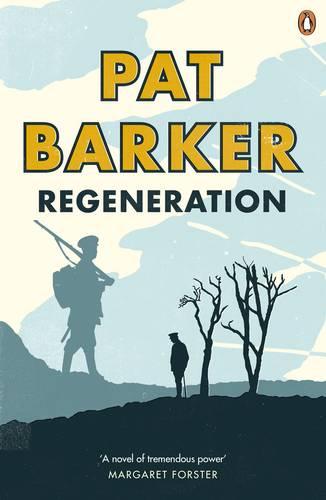Our book group choice for April 2022 is Regeneration by Pat Barker. The first in Pat Barker’s series of novels confronting the psychological effects of World War I, Regeneration focuses on treatment methods during the war and the story of a decorated English officer sent to a military hospital after publicly declaring he will no longer fight.
Regeneration is a 1991 novel by Pat Barker that explores the experience of British army officers being treated for shell shock during World War I at Craiglockhart War Hospital in Edinburgh. The novel is inspired by the experiences of Barker’s grandfather, who was treated at Craiglockhart.
The novel opens with the poet Siegfried Sassoon being sent to Craiglockhart after publicly declaring himself a conscientious objector. Sassoon is initially resistant to treatment, but he eventually opens up to Dr. William Rivers, the hospital’s chief psychiatrist. Rivers is a former anthropologist who believes that shell shock is a physical illness that can be treated through talking therapy.
Sassoon is not the only patient at Craiglockhart who is struggling to cope with the horrors of war. Other patients include Billy Prior, a young soldier who has been mute since witnessing the death of his friend; Robert Graves, a poet and former war correspondent; and Wilfred Owen, a young poet who is struggling with his own doubts about the war.
As the novel progresses, the patients at Craiglockhart begin to heal through their interactions with each other and with Rivers. They begin to talk about their experiences, and they start to understand that they are not alone in their suffering. They also begin to challenge the myths of war, and they start to question the values that led to the war in the first place.
Major Themes
- The horror of war
- The limits of ideologies like nationalism and masculinity
- The medical and popular reactions to the psychological traumas created by the war
- The role of art and literature in healing the trauma of war
- The power of human connection
Regeneration was a critical and commercial success. It was shortlisted for the Booker Prize in 1991, and it won the Guardian Fiction Prize. The novel has been praised for its powerful and insightful exploration of the psychological impact of war. It has also been praised for its complex and nuanced characters.
Here are some additional details about the novel:
- The novel is based on the real-life experiences of Dr. William Rivers, who was a pioneering psychiatrist who treated shell shock patients during World War I.
- The novel draws on first-person narratives from the period, including the work of Siegfried Sassoon, Wilfred Owen, and Robert Graves.
- The novel has been praised for its realistic portrayal of the psychological effects of war, as well as its exploration of the themes of trauma, loss, and healing.
- The novel has been adapted into a film and a television miniseries.
Discussion Questions
- Why is the novel called Regeneration?
- Is Regeneration an anti-war novel? Why or why not?
- When does the motif of emasculation arise in the novel? How do the characters address issues of emasculation caused by the war?
- Describe the role of fathers and mothers in the novel. How do they help or undermine the healing of the patients?
- How is Owen portrayed in the novel? In what ways is he like and unlike Sassoon?
- Is Prior’s relationship with Sarah romantic? Can it be described as love? How does the war affect it?
- Which characters change throughout the course of the novel, and which remain static? What are the larger implications for this personal growth or stagnation?
- Compare Rivers to Yealland. Are either or both doing their “duty”?
- Would you recommend the book?
Individual Ratings
Anthony's Rating 




Sue's Rating 




Jo's Rating 




DKB's Rating 




Baljit's Rating 




Kelby's Rating 





